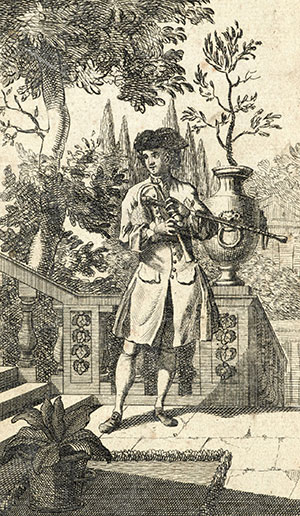Annotation:Dan Gay: Difference between revisions
(Created page with "[[{{BASEPAGENAME}}|Tune properties and standard notation]] ---- <p><font face="garamond, serif" size="4"> '''DAN GAY'''. English, Air (3/4 time). G Major. Standard tuning (fiddl...") |
No edit summary |
||
| (5 intermediate revisions by 3 users not shown) | |||
| Line 1: | Line 1: | ||
---------- | |||
---- | {{TuneAnnotation | ||
|f_tune_annotation_title=https://tunearch.org/wiki/Annotation:Dan_Gay > | |||
'''DAN GAY'''. English, Air (3/4 time). G Major. Standard tuning (fiddle). AB. | |f_annotation=[[File:Geoghegan.jpg|thumb|right|400px|Irish Piper John Geoghegan]]'''DAN GAY'''. English, Air (3/4 time). G Major. Standard tuning (fiddle). AB. This tune is apparently the air for the song "Lass of the Mill", which begins: | ||
< | <blockquote> | ||
< | ''Dan gay first in vogue bro't the blithe Molly Mogg'' | ||
</blockquote> | |||
The song was printed in John Sadler's '''The Muses Delight''' (Liverpool, 1754), on songsheets, and in other pubications. Molly Mogg was in fact a real person, the beautiful eldest daughter of John Mogg, the landlord of the Rose Inn in Workingham (or perhaps in Covent Garden). She is celebrated in the poem "Molly Mogg, or the Fair Maid of the Inn", written by playwright John Gay, with contributions by Alexander Pope and Jonathan Swift. It seems that the three were in the inn for longer than they expected due to a fierce storm, and, to pass the time, they composed verses in honor of Molly, a renowned beauty. Molly was born in 1699 and remained unmarried. When she died in 1740 she was able to leave an inheritance due to her thrift and skill. | |||
|f_source_for_notated_version= | |||
|f_printed_sources=Geoghegan ('''Compleat Tutor for the Pastoral or New Bagpipes'''), c. 1745-46; p. 28. | |||
|f_recorded_sources= | |||
|f_see_also_listing= | |||
}} | |||
------------- | |||
</font></p> | </font></p> | ||
<p><font face=" | <p><font face="sans-serif" size="4"> | ||
''Source for notated version'': | ''Source for notated version'': | ||
<br> | <br> | ||
<br> | <br> | ||
</font></p> | </font></p> | ||
<p><font face=" | <p><font face="sans-serif" size="4"> | ||
''Printed sources'': | ''Printed sources'': | ||
<br> | <br> | ||
<br> | <br> | ||
</font></p> | </font></p> | ||
<p><font face=" | <p><font face="sans-serif" size="4"> | ||
''Recorded sources'': <font color=teal></font> | ''Recorded sources'': <font color=teal></font> | ||
</font></p> | </font></p> | ||
| Line 22: | Line 32: | ||
<br> | <br> | ||
---- | ---- | ||
[[{{BASEPAGENAME}} | '''Back to [[{{BASEPAGENAME}}]]''' | ||
Latest revision as of 06:17, 16 December 2020

Dan gay first in vogue bro't the blithe Molly Mogg
The song was printed in John Sadler's The Muses Delight (Liverpool, 1754), on songsheets, and in other pubications. Molly Mogg was in fact a real person, the beautiful eldest daughter of John Mogg, the landlord of the Rose Inn in Workingham (or perhaps in Covent Garden). She is celebrated in the poem "Molly Mogg, or the Fair Maid of the Inn", written by playwright John Gay, with contributions by Alexander Pope and Jonathan Swift. It seems that the three were in the inn for longer than they expected due to a fierce storm, and, to pass the time, they composed verses in honor of Molly, a renowned beauty. Molly was born in 1699 and remained unmarried. When she died in 1740 she was able to leave an inheritance due to her thrift and skill.
Source for notated version:
Printed sources:
Recorded sources:
Back to Dan Gay

